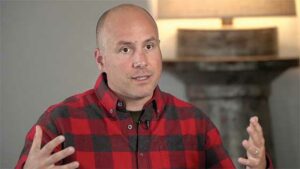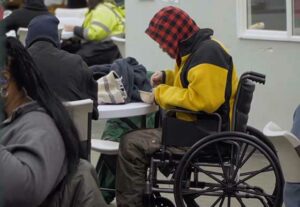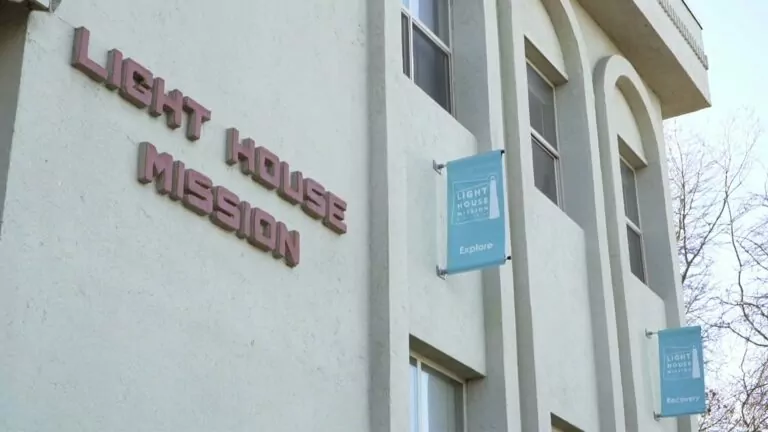By God’s providence, Christians are often in exactly the right place at the right time to do the good works that He prepared for us! For nearly 100 years, the Lighthouse Mission has worked with the down and out on the streets of Bellingham, a university city near the Canadian border, preaching the Gospel while lending a material hand to those in need. As homelessness and despair due to drug addiction have grown in the last ten years, local government officials have begun to lean more and more on the work done by the Lighthouse – work that is helping pull people off the streets, and into productive lives through the power of God’s Word.
Hans Erchinger-Davis is the Executive Director of the Mission. Hans grew up near Bellingham in a Christian home with loving parents who shared the Gospel wherever they went, including a memorable one-year trip through communist eastern Europe when Hans was a boy. Erchinger-Davis studied at Regent College in Vancouver (where Professor J.I. Packer was among his teachers), but his first career was in technology, and later in film. On the cusp of a career as a documentary filmmaker, Hans was offered a job at the Lighthouse Mission in 2006, and his life, and the lives of thousands of others, was changed forever.
Help given in the Name of God

Executive Director Hans Erchinger-Davis has been working at the Mission since 2006.
Erchinger-Davis estimates that there are between 800 and 1,000 homeless people in Whatcom county at any one time, with the majority living on the city streets of downtown Bellingham. Volunteers and employees of the Mission make regular contact with these struggling men and women, giving out coffee and clothing, and inviting them to “base camp” for a hot meal and shelter for the night. Already at “base camp,” counselors share the good news of Jesus Christ, and offer resources and referrals, letting the new arrivals know that there is a way out of the despair in which they find themselves.
Those who are willing to move up from “base camp” into a formal program of recovery must commit to being off drugs and alcohol before they are admitted to recovery houses that build on the foundation of drug-free, value-filled living, to begin training towards a productive life. “The Christian message is always part of our teaching,” says Erchinger-Davis. “Ninety-nine percent of our graduates are Christians or become Christians.”
“We follow Jesus onto the streets and encampments in our community. The message of Jesus cannot be separated from the services we offer. It is in our DNA to carry out the mission of healing homelessness with Christ’s power and love,” said Erchinger-Davis. “It’s because of this that the Lighthouse Mission declines any offers of government funding for programs and services that might limit the ability for us to provide our homeless friend voluntary participation in prayer, worship, Bible studies and basic Christian discipleship.”
Eager to do even more
Now, in 2023, the Lighthouse Mission is in the middle of an ambitious construction project: the building out of which the Mission did its main work was in rough shape, and the Mission’s board decided that the most cost-effective solution was to tear it down and re-build a more suitable facility, with room for more training, more beds, more cooking facilities, and room for small retail businesses that those in the program can operate.
Whatcom County (in which Bellingham is located) has a fairly liberal governing “county council,” although there are believers among the county representatives. Officials have acknowledged publicly and privately that the Mission does invaluable work among the homeless that local government is not able to provide. As a result, both the city and county had committed to helping fund portions of the construction project that were centered on humanitarian aid (things like shelter, meals, and vocational training).
Setbacks, but no compromise

The Mission provides hot meals, but they don’t stop with providing for the physical. It is always delivered in the context of the Gospel.
Recently however, one of the county council members made it her personal mission to deny any funding to the rebuilding project due to the Mission’s “discriminatory” hiring practices. (The Lighthouse Mission requires that all of its employees acknowledge the organization’s Christian roots, including a Biblical understanding of human sexuality and the sinfulness of homosexual relationships.) The council member won a temporary victory, as the body decided not to provide funding for any of the Mission’s rebuild (even the portions of the work that could be described as humanitarian aid).
Again, by the grace of the Lord, this temporary setback was overcome in God’s providence. Just a few days after the council made its decision, a local donor contacted Hans to let him know that he and his family would be donating $400,000 to help cover the shortfall. But that was just the beginning! Kathy Kershner, a Christian who serves on county council, lobbied the other members of council, reminding them of the valuable services that the Mission provides to Whatcom County. Kershner moved to rescind the motion denying funding, and a majority of council agreed.
Hope for future rests in the Lord
Despite many victories and successes for the Mission, Erchinger-Davis’ personal life has been visited with tragedy. His father, a faithful Christian, struggled with bi-polar disorder. His best friend from high school became a drug addict, and despite intervention attempts and help that was available so close by, died of a drug overdose a couple of blocks from Hans’ office. Echinger-Davis’ sister was a victim of domestic violence, and recently took her own life, leaving behind two young children.
While some might despair at these tragedies, Hans is able to rejoice in God’s goodness, and to accept that God has a plan that he can’t fully understand. “It’s hard! My friend died, and I was not able to help him, but partly through my own work, the Mission has been able to help thousands who have escaped lives of brokenness through God’s love.” The Lord has put His people where they are needed to fulfill His gracious plan. Hans summarizes: “We aim for healing homelessness both in the present, the future, and for eternity with the tender love of Jesus Christ in Whatcom County.”
Assistant Editor Marty VanDriel is a board member of the Lighthouse Mission Ministries Foundation, which provides long-term funding for the work of the Lighthouse Mission Ministry, and was asked by the editor to profile the organization. Pictures have are frame captures, taken with permission, from Lighthouse Mission Ministries Foundation’s 5-part video series “Hope for Bellingham: Response to Homelessness,” the first of which you can watch below. Find the rest here.













